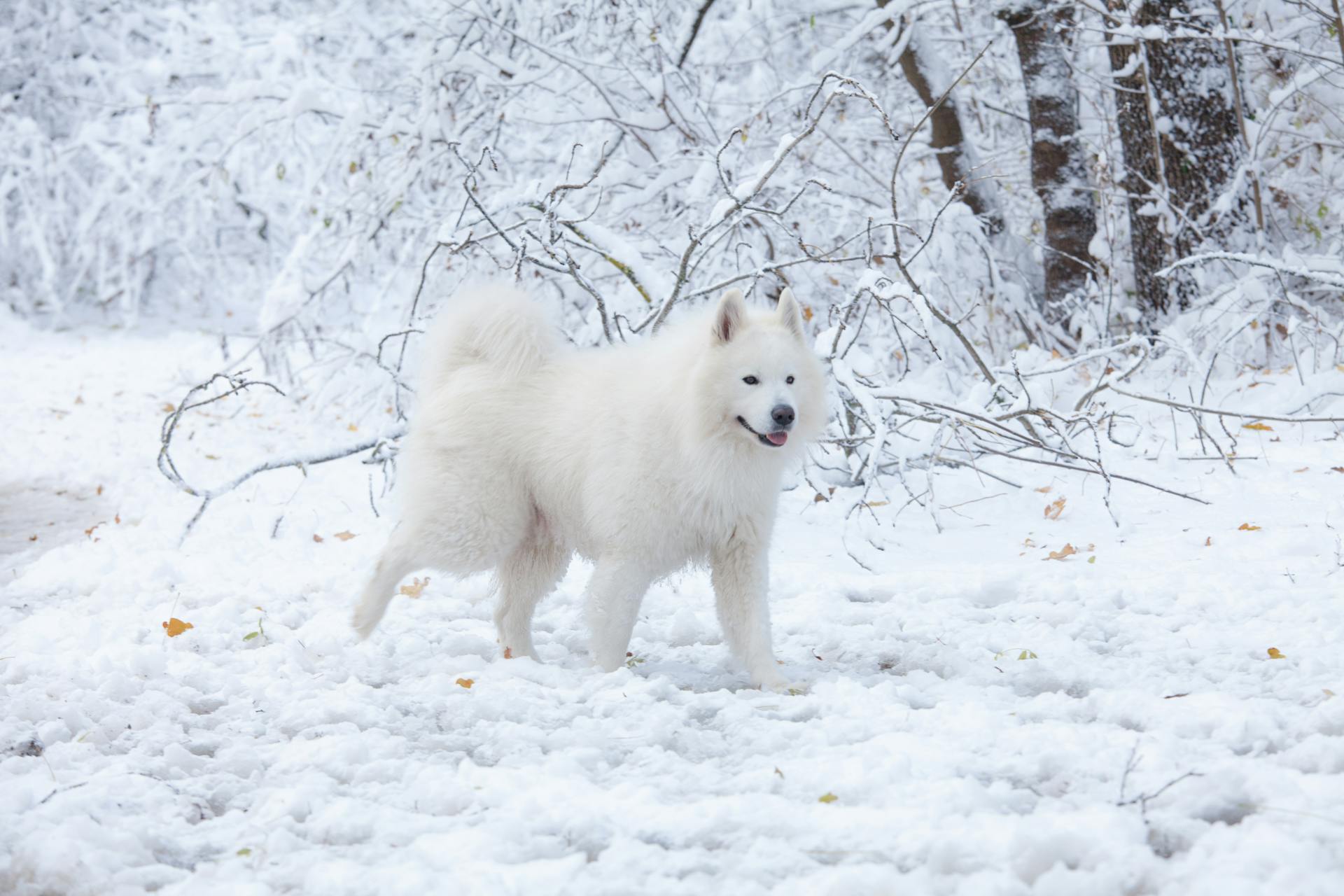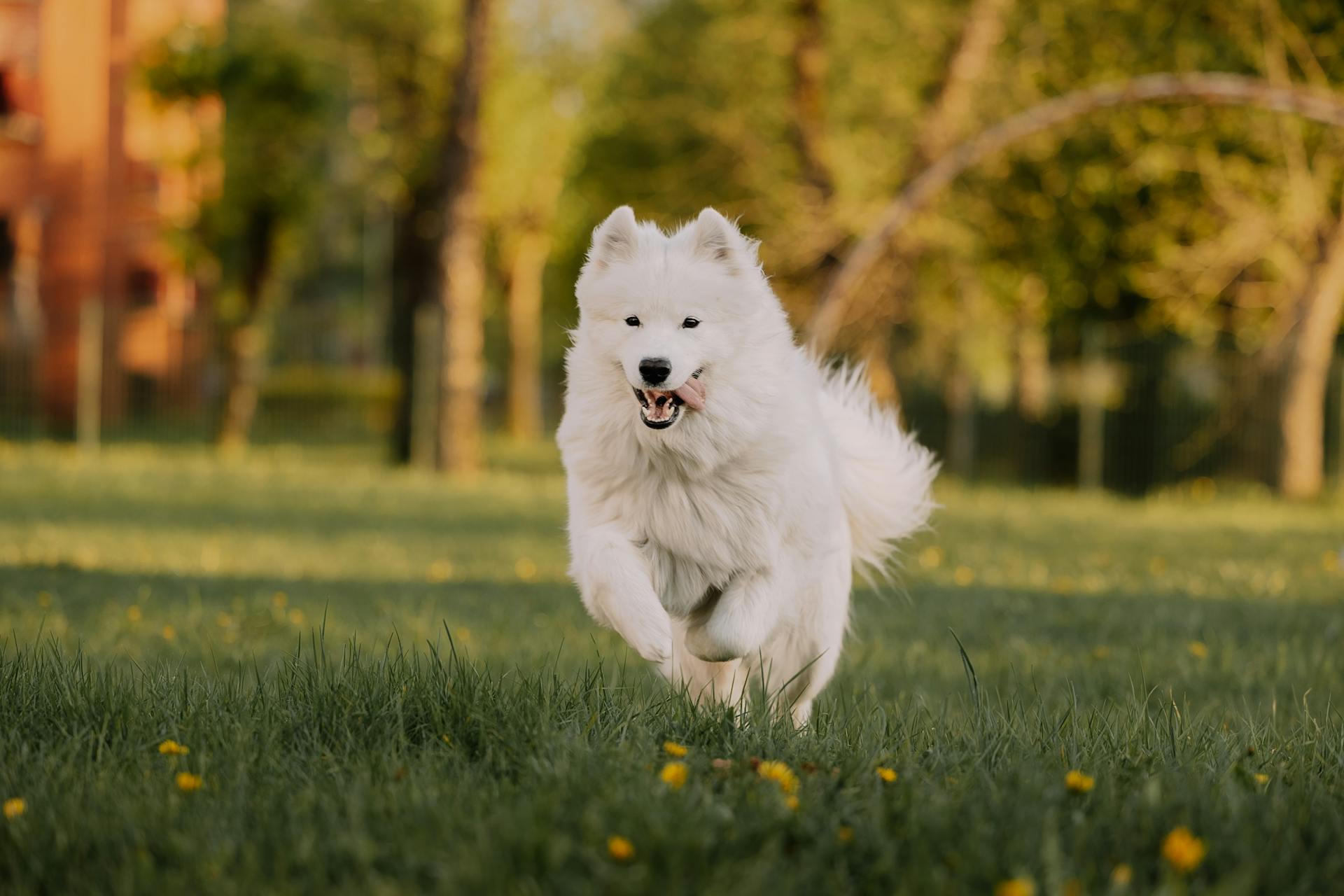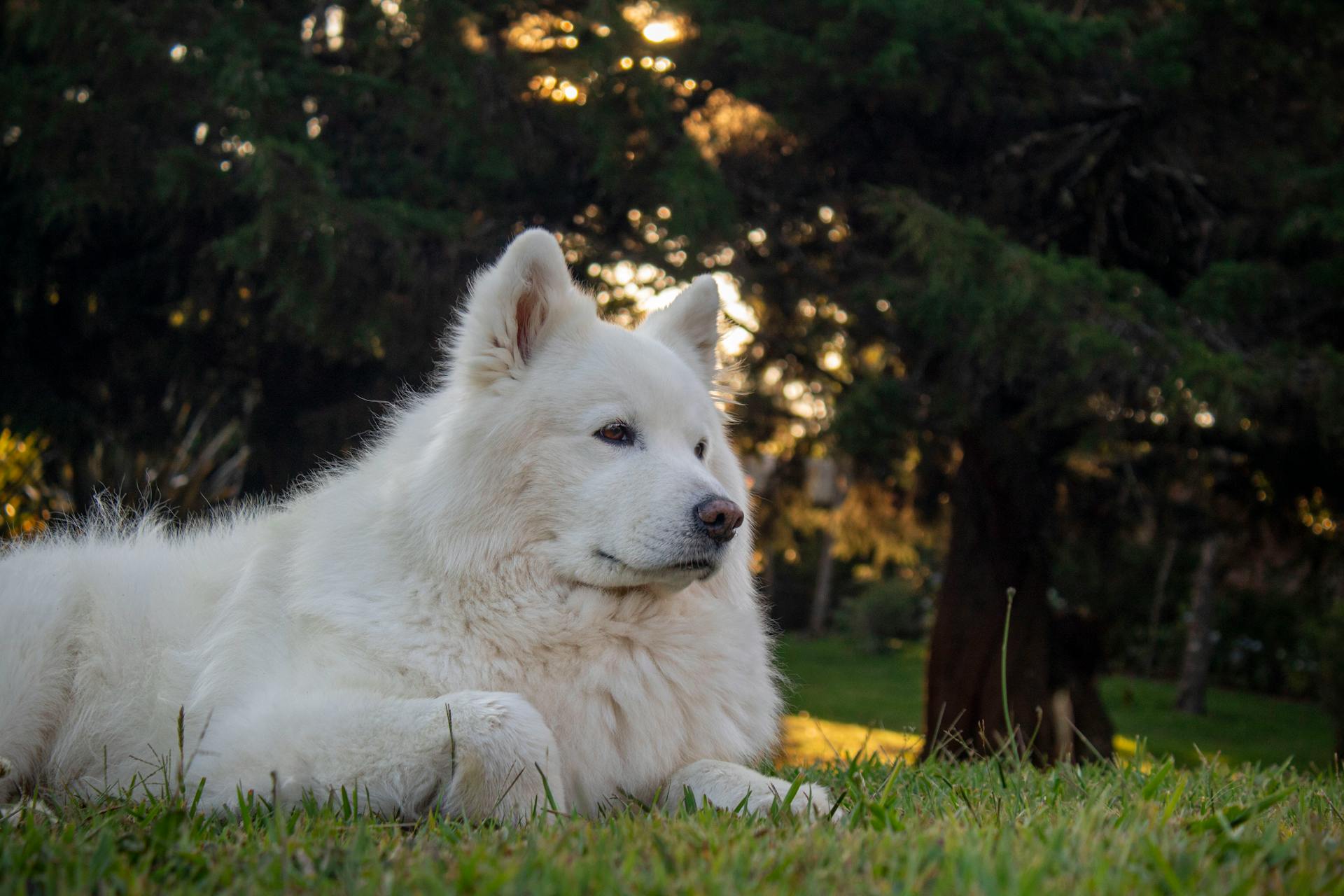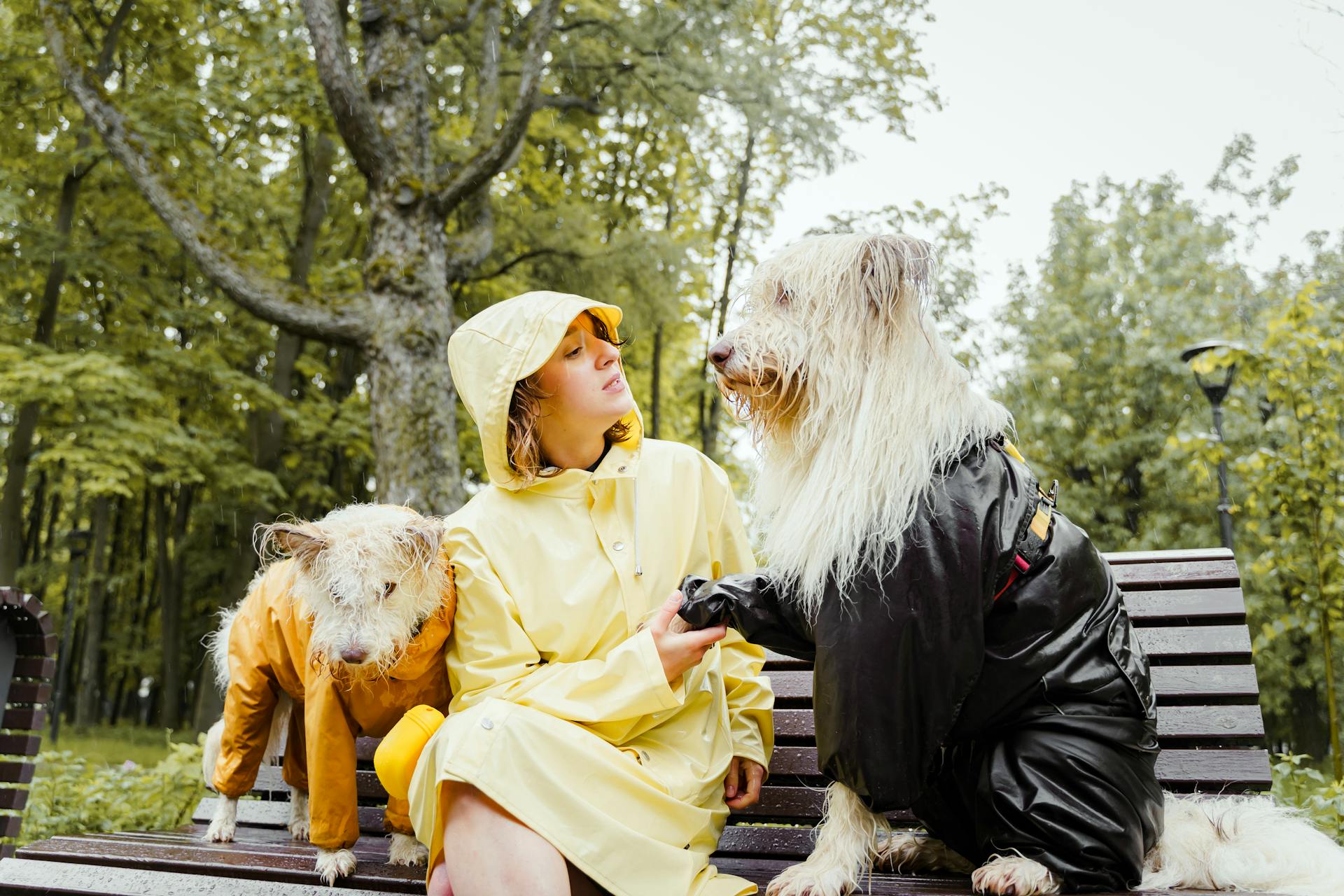
Adopting a Samoyed dog can be a wonderful experience, but it's essential to understand their needs to ensure a happy and healthy relationship.
Samoyeds are a high-energy breed, requiring regular exercise to stay happy and healthy. They need at least 30 minutes of exercise per day, which can include walks, runs, and playtime.
Samoyeds are also known for their thick double coat, which sheds heavily, especially during shedding season. They require regular grooming to prevent matting and tangling.
Samoyeds are intelligent and trainable, but they can be stubborn at times, requiring patient and consistent training.
Adopting a Samoyed
Adopting a Samoyed is a wonderful way to bring joy and companionship into your life. A Samoyed puppy can be a part of your family for many years, given their average lifespan of 12-14 years with proper care.
You have the opportunity to start training early with a puppy, providing a solid foundation for future behavior. This is especially beneficial as it allows you to develop a deep connection with your new furry friend.
Expand your knowledge: Samoyed Puppy Dog
Adopting an adult Samoyed is also a great option, offering several advantages. With an adult Samoyed, their personality, size, and health status are already established, eliminating some uncertainties that come with puppies.
Here are some key differences to consider between adopting a puppy and an adult Samoyed:
- Puppies: Training Potential, Deep Bonding, Long Life Ahead
- Adults: Known Characteristics, Less Training Needed, Calmer Disposition
Regardless of age, a Samoyed will offer you loyalty, affection, and a "Sammy smile" that's sure to warm your heart.
Training and Behavior
Training a Samoyed requires patience, dedication, and a calm manner, as they can be very independent and want to do things on their own.
They are highly intelligent, but may not always listen, so it's essential to keep training sessions short and fun. Positive reinforcement with their favorite snacks, toys, or treats is a great way to encourage learning.
To ensure a well-behaved Samoyed, teach them basic commands, recall, loose lead walking, and settling skills, which will help you spend quality time together without worry. Regular grooming is also crucial, as they have a double coat that requires regular brushing, nail grinding, and bathing.
Training
Training a Samoyed requires patience, dedication, and a calm manner. They can be taught basic commands and tricks with positive reinforcement.
Samoyeds are very smart, but also very independent. They want to do things on their own and when they want to do them. They can be challenging to train, but with the right approach, you can succeed.
Regular grooming is essential for Samoyeds to maintain their beautiful coats. They have a double coat that requires regular grooming, including a weekly nail grind or trim and a monthly full shampoo and bath.
Training should include socializing with other dogs of like age and teaching them to ride well in a crate or with a seatbelt tether. This helps them become well-adjusted and calm companions.
Positive reinforcement is key when training a Samoyed. Find out their favorite snacks, toys, or treats and use them as rewards during training. This makes the learning process more enjoyable for both you and your dog.
Your Samoyed needs to learn useful life skills like recall, loose lead walking, and settling. This helps you spend quality time together without worry, both at home and outside.
Recommended read: Samoyed Dog Grooming
Behaviour
Samoyeds are friendly and affectionate dogs, loving to be around people and getting attention from just about everyone. They will often lick visitors and enjoy being pet and getting attention all day long.
Their temperament is shaped by their experiences, and every Samoyed is unique. They learn about the world and figure out their likes and dislikes, which can affect how they respond to situations.
Samoyeds are intelligent dogs, but they can be independent and stubborn at times. They require consistent training and socialization to become well-behaved companions.
Some Samoyeds might be wary of new dogs or experiences, while others are eager to meet new friends. It's essential to socialize them well to help them become confident and calm in new situations.
Every dog is different, and Samoyeds are no exception. They may have varying levels of energy and patience, which is why it's crucial to understand their individual personalities and needs.
Health and Wellness
Samoyeds are generally a healthy breed, but they can be prone to health issues if not properly cared for. Some potential health issues include eye problems, hip issues, and heart conditions.
It's essential to feed your Samoyed a premium diet to maintain a healthy weight. Overweight Samoyeds can lead to decreased life expectancy. They have efficient metabolisms and require lower amounts of high-quality food than many other breeds.
Fresh water should always be available, and it's best to feed them twice a day, never leaving food out throughout the day.
You might enjoy: Food Alternatives for Dogs
Health Issues
Samoyeds are generally a healthy breed, but some issues can arise if not fed a good diet or if allowed to become overweight.
Specialized health testing is done for Samoyeds before breeding, including tests for eyes, hips, and heart.
Your breeder will enlighten you on this testing, so be sure to ask them about it.
Not every dog suffers from potential health issues, but it's good to be prepared.
Expand your knowledge: Samoyed Good Apartment Dogs

Your local vet can provide advice on potential health conditions, management options, and associated costs through a pre-purchase consultation.
They can also give you advice on finding a responsible breeder and testing for inheritable diseases if you're thinking of buying a puppy.
All dogs need basic preventative health care, including vaccinations and flea and worming treatments.
Insurance is also a must to help cover the cost of vet bills.
Here's an interesting read: Veteran Dog Treats
How to Perform a Health Check
Performing a health check is an essential part of maintaining overall wellness, and it's easier than you think.
Start by tracking your daily habits, including the foods you eat and the amount of physical activity you get. According to the article, a healthy diet should include a variety of whole foods like fruits, vegetables, whole grains, and lean proteins.
Drink at least eight glasses of water a day to stay hydrated, and aim for 7-9 hours of sleep each night.

Regular exercise can help lower blood pressure and improve cardiovascular health. The article suggests aiming for at least 150 minutes of moderate-intensity exercise or 75 minutes of vigorous-intensity exercise per week.
Take note of any changes in your body, such as unusual pain or fatigue. If you're experiencing persistent symptoms, consult with a healthcare professional for guidance.
Monitoring your vital signs, including blood pressure, heart rate, and body temperature, can help identify potential health issues early on.
Caring for
Caring for a Samoyed requires attention to its unique hair care needs. Their thick coat sheds heavily and gets everywhere, so be prepared for daily vacuuming and using lint brushes on furniture and floors.
Samoyeds need regular grooming to prevent matting and tangling, but even with regular brushing, their hair will still get all over the place.
You may want to consider blowing your Samoyed's coat a couple of times a year to keep it looking its best.
Sources
- https://www.denversamoyed.org/finding-a-samoyed
- https://www.petfinder.com/member/us/co/erie/denver-samoyed-rescue-co223/
- https://www.petsmont.com/blogs/pets/top-things-to-know-before-a-samoyed-adoption
- https://www.dogstrust.org.uk/dog-advice/getting-dog/breeds/samoyed
- https://iheartdogs.com/adopting-an-adult-samoyed-vs-a-puppy-pros-and-cons/
Featured Images: pexels.com


